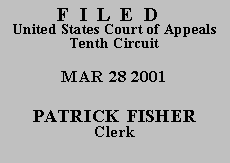

| SAMUEL O. TELLES, |
|
| v. | |
| ELOY MONDRAGON, Warden, Guadalupe County Correctional Facility; ATTORNEY GENERAL FOR THE STATE OF NEW MEXICO, |
Samuel O. Telles, a New Mexico state prisoner proceeding pro se, seeks to appeal the district court's order denying his petition for a writ of habeas corpus pursuant to 28 U.S.C. § 2254. For the reasons set forth below, we conclude that Mr. Telles has waived his right to appellate review and dismiss this appeal.
The underlying facts are fully set forth in the New Mexico Court of Appeals opinion. See State v. Telles, 973 P.2d 845 (N.M. Ct. App. 1998). While driving home from a bar in February 1996, Mr. Telles collided with a motorcycle, injuring the driver and killing the passenger. At the time of the accident, law enforcement officers measured his blood alcohol content at .22--an amount over the level (.08) that constitutes driving under the influence under New Mexico law. See N.M. Stat. Ann. § 66-8-102 (1978). A New Mexico state court convicted Mr.Telles of the following offenses: homicide by vehicle, great bodily injury by vehicle, and driving without insurance. On the first offense, the court sentenced him to a term of six years' imprisonment, enhanced by a four-year term based on two prior Florida convictions for driving while impaired. On the second offense, the court sentenced him to a term of three years; it also enhanced that term by four years based on the Florida convictions. On the third offense, it sentenced him to ninety days' imprisonment.
The New Mexico Court of Appeals affirmed Mr. Telles's conviction and sentence. After seeking collateral relief in the New Mexico state courts, Mr. Telles filed the instant habeas petition in the federal district court. He asserted the following claims: (1) that law enforcement officers' comments about his post-arrest silence violated his Fifth Amendment rights; (2) that the state trial court's exclusion of evidence regarding the blood alcohol level and drug use of the motorcycle's driver and passenger violated his due process rights; (3) that the use of the Florida convictions to enhance his sentence violated his due process rights; and (4) that he received ineffective assistance of counsel because his attorney failed to call a witness who would have testified that the motorcycle was driven recklessly.
The magistrate judge issued findings and recommendations concluding that Mr. Telles's habeas petition should be denied. The magistrate informed Mr. Telles that, pursuant to 28 U.S.C. § 636(b)(1), he had ten days to file written objections. The magistrate judge explained that "[a] party must file any objections with the clerk of the district court within the ten day period allowed if that party wants to have appellate review of the proposed findings and recommendations. If no objections are filed, no appellate review will be allowed." Rec. doc.11, at 11 (Proposed Findings and Recommended Disposition, filed Nov. 23, 1999).
Mr. Telles did not file objections. The district court then adopted the magistrate's findings and recommended disposition and denied Mr. Telles's petition. After Mr. Telles filed his notice of appeal, this court issued an order directing Mr. Telles to show why his appeal should not be dismissed for failure to object to the magistrate's findings and recommendations. Mr. Telles filed a brief in response to the order, but it fails to explain why he did not file objections. "This circuit has adopted a firm waiver rule under which a party who fails to make timely objection to the magistrate's findings and recommendations waives appellate review of both factual and legal questions." Talley v. Hesse, 91 F.3d 1411, 1412 (10th Cir. 1996); see also Frontier Refining Inc. v. Gorman- Rupp Co., 136 F.3d 695, 706 (10th Cir. 1998). There are two exceptions to this rule: (1) "when the magistrate's order does not clearly apprise a pro se litigant of the consequences of a failure to object," Talley, 91 F.3d at 1413; and (2) "when the ends of justice dictate otherwise." Id.
Neither exception is applicable here. The magistrate's findings and recommended disposition clearly informed Mr. Telles that the failure to file written objections would result in waiver of appellate review. Moreover, with one exception, the arguments raised by Mr. Telles in his appellate brief have been thoroughly and persuasively rejected by the magistrate judge. Thus, the interests of justice do not warrant excusing Mr. Telles from the waiver rule.(1)
Accordingly, we DENY Mr Telles's application for a certificate of appealability and DISMISS this appeal.
Entered for the Court,
Robert H. Henry
Circuit Judge
*. This order and judgment is not binding precedent, except under the doctrines of law of the case, res judicata, and collateral estoppel. The court generally disfavors the citation of orders and judgments; nevertheless, an order and judgment may be cited under the terms and conditions of 10th Cir. R. 36.3.
1. In his appellate brief, Mr. Telles argues that one of the Florida convictions used to enhance his sentence has been dismissed and therefore cannot be used to enhance his sentence. See Aplt's Br. at 4, 14. For several reasons, the interests of justice do not warrant our considering this claim on the merits.
First, Mr. Telles did not raise this issue in his federal habeas petition, and, as a result, the magistrate judge did not address it. Additionally, the evidentiary materials that Mr. Telles attaches to his appellate brief do not provide sufficient support for this claim. In particular, one document indicates that, on February 25, 1994, a Florida court dismissed a charge for operating a motor vehicle without a license. A second document indicates that, on June 2, 1994, the state announced its intention to file a nolle prosequi on a Florida charge for driving under the influence. Neither document establishes that the particular convictions on which the New Mexico court relied in enhancing Mr. Telles's sentence have been vacated.